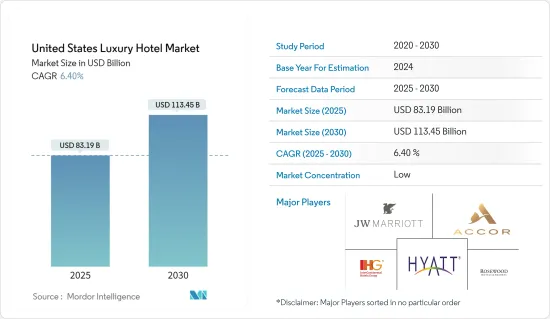PUBLISHER: Mordor Intelligence | PRODUCT CODE: 1644475

PUBLISHER: Mordor Intelligence | PRODUCT CODE: 1644475
United States Luxury Hotel - Market Share Analysis, Industry Trends & Statistics, Growth Forecasts (2025 - 2030)
The United States Luxury Hotel Market size is estimated at USD 83.19 billion in 2025, and is expected to reach USD 113.45 billion by 2030, at a CAGR of 6.4% during the forecast period (2025-2030).

The US luxury hotel market epitomizes opulence, sophistication, and top-tier hospitality, designed to cater to discerning travelers. These guests seek not just a stay but an experience that defines luxury. From iconic urban landmarks to serene resort getaways, US luxury hotels promise a diverse range of experiences, each crafted to surpass the expectations of even the most discerning patrons.
These hotels are renowned for their lavish amenities, meticulous attention to detail, and exquisite designs, creating sanctuaries of indulgence and relaxation. Be it Michelin-starred dining, world-class spas, or personalized concierge services, these establishments leave no stone unturned in ensuring an unforgettable guest experience.
Moreover, the US luxury hotel industry thrives on fierce competition and relentless innovation. Hoteliers consistently push boundaries, leveraging cutting-edge technology, championing sustainability, and forming exclusive partnerships with top brands. While the United States maintains its status as a luxury travel hub, the market adapts to embrace trends like wellness tourism and experiential travel, all while upholding its commitment to excellence and unparalleled hospitality.
United States Luxury Hotel Market Trends
The Growth of the Tourism Industry in the United States is Driving the Market
The expansion of the tourism industry in the United States is significantly boosting the luxury hotel market, fueling both demand and revenue. As the number of tourists increases, the need for accommodations rises, creating attractive opportunities for luxury hotels. This uptick in demand not only allows these hotels to attract travelers seeking top-tier experiences and amenities but also those willing to pay a premium for exceptional service.
Moreover, the uptick in tourism translates directly into higher revenues for luxury hotels. With more visitors exploring the country, these hotels enjoy increased occupancy rates, elevated room charges, and heightened spending on ancillary services such as dining, spa treatments, and exclusive experiences.
Furthermore, the robust growth in tourism is encouraging developers and investors to bolster their luxury hotel portfolios. This expansion may involve constructing new properties or revamping existing ones to meet the surging demand, further cementing luxury hotels' standing in the hospitality landscape.
The Influx of Tourists to Luxury Hotels in United States Boosting Market Growth
The surge in Chinese travelers to the United States is igniting growth within the luxury hotel market. Recent data indicates an expansion in the number of luxury hotels in the United States, reflecting a steady increase driven by rising demand from international and domestic markets for premium accommodations.
Luxury hotel chains like Four Seasons highlight China as a pivotal market, showcasing its significance as one of their top source markets. Revenue from Chinese travelers has demonstrated robust growth in recent years, underlining their increasing influence and purchasing power in the luxury hospitality segment.
As Chinese tourism continues to thrive, luxury hotel developers and investors are poised to capitalize on this trend. The sustained growth in luxury hotels underscores a commitment to providing exceptional experiences tailored to the preferences of affluent travelers, ensuring memorable stays for guests from around the globe.
United States Luxury Hotel Industry Overview
The landscape of the luxury hotel market in the United States is characterized by fragmentation, with numerous companies vying for market share. Nonetheless, medium-sized and smaller enterprises are broadening their reach by securing fresh contracts and venturing into untapped markets, leveraging advancements in technology and product offerings. Leading brands are establishing exclusive boutiques to showcase exceptional products.
Prominent players such as JW Marriott, Hyatt Corporation, Accor, InterContinental Hotels Group, and Rosewood Hotels hold significant sway in the US luxury hotel market.
Additional Benefits:
- The market estimate (ME) sheet in Excel format
- 3 months of analyst support
TABLE OF CONTENTS
1 INTRODUCTION
- 1.1 Study Assumptions and Market Definition
- 1.2 Scope of Study
2 RESEARCH METHODOLOGY
3 EXECUTIVE SUMMARY
4 MARKET INSIGHTS AND DYNAMICS
- 4.1 Market Overview
- 4.2 Market Drivers
- 4.2.1 Increasing Number of Travelers Embracing Luxury Lifestyles
- 4.2.2 Building Brand Reputation and Fostering Loyalty
- 4.3 Market Restraints/ Challenges
- 4.3.1 Shifting Tastes Among Consumers
- 4.3.2 Increasing Operational Expenses
- 4.4 Market Opportunities
- 4.4.1 Focusing on Specialized Markets
- 4.4.2 Technological Progress
- 4.5 Porter's Five Forces Analysis
- 4.5.1 Threat of New Entrants
- 4.5.2 Bargaining Power of Buyers/ Consumers
- 4.5.3 Bargaining Power of Suppliers
- 4.5.4 Threat of Substitute Products
- 4.5.5 Intensity of Competitive Rivalry
- 4.6 Impact of COVID-19 on the Market
5 MARKET SEGMENTATION
- 5.1 By Service Type
- 5.1.1 Business Hotels
- 5.1.2 Airport Hotels
- 5.1.3 Suite Hotel
- 5.1.4 Resorts
- 5.1.5 Other Service Types
- 5.2 By Theme
- 5.2.1 Heritage
- 5.2.2 Contemporary
- 5.2.3 Modern
- 5.2.4 Other Themes
6 COMPETITIVE LANDSCAPE
- 6.1 Market Concentration Overview
- 6.2 Company Profiles
- 6.2.1 JW Marriott
- 6.2.2 Hyatt Corporation
- 6.2.3 Accor
- 6.2.4 InterContinental Hotels Group
- 6.2.5 Rose Wood Hotel
- 6.2.6 Rencho Valnecia Resort
- 6.2.7 Cavallo Point
- 6.2.8 Long Beach Lodge Resort
- 6.2.9 The Mark Hotel
- 6.2.10 Nimmo Bay, Great Bear Rainforest*
7 MARKET FUTURE TRENDS
8 DISCLAIMER
9 ABOUT US




